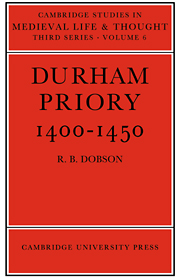Book contents
- Frontmatter
- Contents
- List of figures
- Preface
- List of abbreviations
- Introduction
- 1 THE ENGLISH ZION: AN INTRODUCTION TO SAINT CUTHBERT AND HIS CITY
- 2 THE MONKS OF DURHAM
- 3 JOHN WESSINGTON AS PRIOR OF DURHAM (1416–46)
- 4 THE PRIOR'S HOUSEHOLD AND COUNSELLORS
- 5 MONASTIC PATRONAGE
- 6 THE PRIOR AND THE LAY LORDS
- 7 THE LORDS SPIRITUAL
- 8 THE MONASTIC ECONOMY
- 9 THE DURHAM CELLS
- 10 THE INTELLECTUAL ACTIVITIES OF THE DURHAM MONKS
- Conclusion
- Bibliography
- Index
6 - THE PRIOR AND THE LAY LORDS
Published online by Cambridge University Press: 14 October 2009
- Frontmatter
- Contents
- List of figures
- Preface
- List of abbreviations
- Introduction
- 1 THE ENGLISH ZION: AN INTRODUCTION TO SAINT CUTHBERT AND HIS CITY
- 2 THE MONKS OF DURHAM
- 3 JOHN WESSINGTON AS PRIOR OF DURHAM (1416–46)
- 4 THE PRIOR'S HOUSEHOLD AND COUNSELLORS
- 5 MONASTIC PATRONAGE
- 6 THE PRIOR AND THE LAY LORDS
- 7 THE LORDS SPIRITUAL
- 8 THE MONASTIC ECONOMY
- 9 THE DURHAM CELLS
- 10 THE INTELLECTUAL ACTIVITIES OF THE DURHAM MONKS
- Conclusion
- Bibliography
- Index
Summary
A man of peace! Give us a man of peace!
As the superior of the most celebrated English monastery north of York the prior of Durham was a public figure as well as a spiritual leader. Lords, both spiritual and temporal, requested from him not only benefices, offices and scholarships but also his own services. Prior Wessington had himself no particular desire to play a prominent role in either national or local politics and lacked both the ambition and unscrupulousness which secured the bishopric of Carlisle for one of his successors, Richard Bell. No prior was more sensitive than Wessington to any attempt at depriving the cathedral church of Durham of its traditional privileges and liberties; but his attitude to matters which did not directly concern the welfare of the monastery was cautious and diffident in the extreme. The reasons Wessington gave for his refusal to serve on the English commission negotiating an extension of the truce with the Scots in 1444 are characteristic of his usual prudence. ‘And if I wer of connyng and hele to labour and ony poynt where movyd and haldyn agayns the Scottes entent, thei wald pute itt in parte to me, and malyne agens the hoys of Coldyngham, and our lyffolod oppon the marches.’ Some priors of Durham were less nervous and not only served on royal commissions of truce but took an active interest in local and especially Anglo-Scottish affairs.
- Type
- Chapter
- Information
- Durham Priory 1400–1450 , pp. 173 - 202Publisher: Cambridge University PressPrint publication year: 1973



